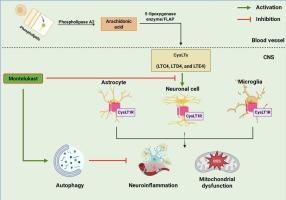白三烯通路在帕金森病中的失调:孟鲁司特的潜在作用
IF 3.7
3区 医学
Q2 BIOCHEMISTRY & MOLECULAR BIOLOGY
引用次数: 0
摘要
白三烯是由白细胞和肥大细胞释放的炎症分子,通过激活白细胞趋化性和血管通透性诱导炎症。值得注意的是,LT通路与不同神经退行性疾病(如帕金森病(PD))的发生和进展有关。临床前研究表明,LT通路通过诱导神经炎症的发生参与PD的病理生理。PD中LT通路的夸张和过度激活的根本原因尚不完全清楚。因此,靶向LT通路可能会减少PD患者神经炎症的进展。此外,半胱氨酸白三烯受体1 (cysllt1r)拮抗剂孟鲁司特通过其抗氧化和抗炎作用对PD神经病理具有神经保护作用;然而,孟鲁司特在减轻PD神经病理中的确切作用尚未得到充分解释。因此,本文旨在讨论LT通路在PD发病机制中的潜在作用,以及孟鲁司特如何从细胞和分子的角度减轻PD神经病理。本文章由计算机程序翻译,如有差异,请以英文原文为准。

Dysregulation of the leukotriene pathway in Parkinson's disease: The potential role of montelukast
Leukotrienes (LTs) are inflammatory molecules released from leukocytes and mast cells that induce inflammation by activating leukocyte chemotaxis and vascular permeability. Notably, the LT pathway is implicated in the development and progression of different neurodegenerative diseases such as Parkinson's disease (PD). Preclinical research indicated that the LT pathway contributes to the pathophysiology of PD by inducing the development of neuroinflammation. The underlying causes for the exaggeration and over-activation of the LT pathway in PD are not completely clarified. Therefore, targeting the LT pathway may reduce the progression of neuroinflammation in PD. Besides, cysteinyl leukotriene receptor 1 (CysLT1R) antagonist montelukast has a neuroprotective effect against PD neuropathology by its antioxidant and anti-inflammatory effects; nevertheless, the exact role of montelukast in mitigating PD neuropathology is not fully explained. Consequently, this review aims to discuss the potential role of the LT pathway in PD pathogenesis and how montelukast alleviates PD neuropathology regarding the cellular and molecular effects.
求助全文
通过发布文献求助,成功后即可免费获取论文全文。
去求助
来源期刊

Cytokine
医学-免疫学
CiteScore
7.60
自引率
2.60%
发文量
262
审稿时长
48 days
期刊介绍:
The journal Cytokine has an open access mirror journal Cytokine: X, sharing the same aims and scope, editorial team, submission system and rigorous peer review.
* Devoted exclusively to the study of the molecular biology, genetics, biochemistry, immunology, genome-wide association studies, pathobiology, diagnostic and clinical applications of all known interleukins, hematopoietic factors, growth factors, cytotoxins, interferons, new cytokines, and chemokines, Cytokine provides comprehensive coverage of cytokines and their mechanisms of actions, 12 times a year by publishing original high quality refereed scientific papers from prominent investigators in both the academic and industrial sectors.
We will publish 3 major types of manuscripts:
1) Original manuscripts describing research results.
2) Basic and clinical reviews describing cytokine actions and regulation.
3) Short commentaries/perspectives on recently published aspects of cytokines, pathogenesis and clinical results.
 求助内容:
求助内容: 应助结果提醒方式:
应助结果提醒方式:


